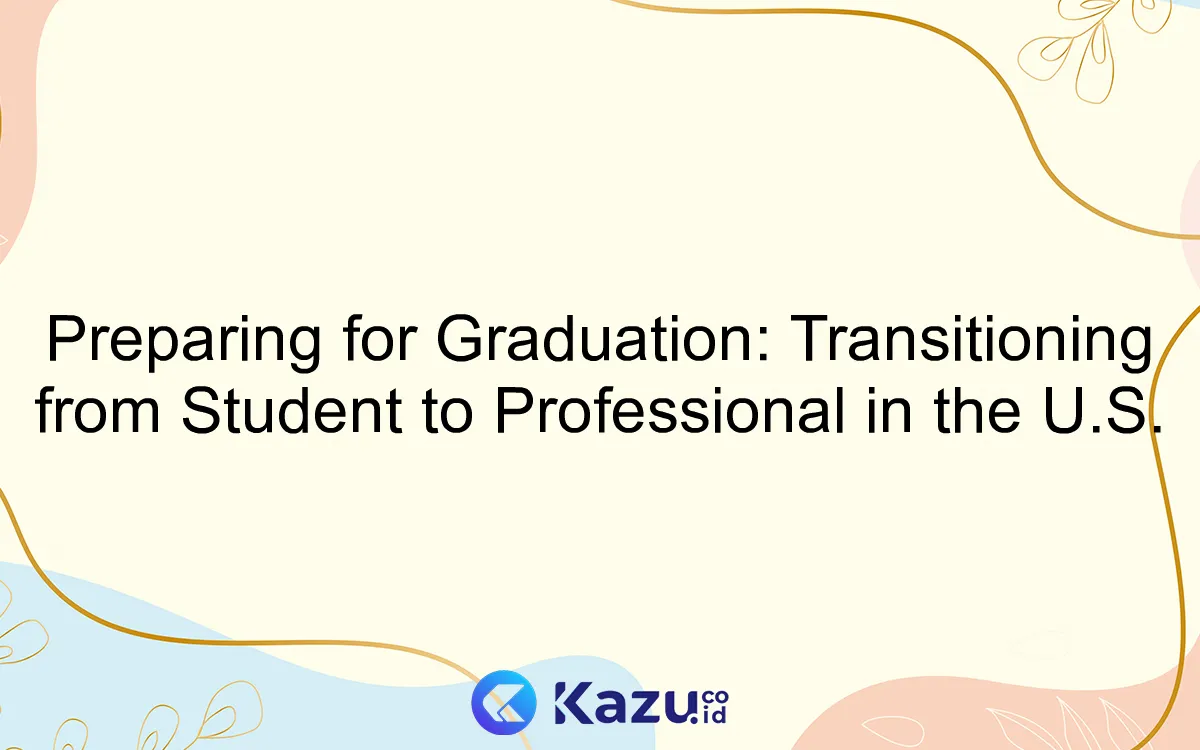Graduation marks a significant milestone in one’s life, especially for international students transitioning into the professional world in the United States. As they prepare to embark on their career journey, it is crucial to navigate through the challenges and opportunities that come with being a young professional in a foreign country.
Creating a Professional Resume
When preparing to graduate and transition from student life to the professional world in the United States, one of the most crucial steps is creating a professional resume. A resume serves as a snapshot of your qualifications, skills, and experiences for potential employers.
To craft a standout resume, consider the following tips:
- Format: Start with a clean and organized format. Use headings, bullet points, and appropriate spacing to make your resume visually appealing and easy to read.
- Targeted content: Tailor your resume to the specific job or industry you are applying for. Highlight relevant experiences, skills, and achievements that align with the position.
- Clear and concise: Keep your resume concise and avoid unnecessary information. Use action verbs and quantifiable results to demonstrate your accomplishments.
- Education and experience: Include your educational background and relevant work experiences. Emphasize internships, projects, or any hands-on experiences that showcase your capabilities.
- Skills: List your technical and transferable skills that are applicable to the job. This could include proficiency in specific software, languages, or leadership abilities.
- References: Consider including references or stating “References available upon request” at the end of your resume.
Remember, your resume should be a reflection of your professionalism and suitability for the desired role. Take the time to proofread and ensure there are no typos or grammatical errors.
By creating a professional resume that effectively showcases your qualifications, you’ll be better equipped to navigate the job market and increase your chances of securing interviews and employment opportunities.
Networking Strategies for Job Seekers

As a recent graduate transitioning from student to professional in the U.S., it is important to develop effective networking strategies to enhance your job search and career prospects. Networking can significantly increase your chances of finding job opportunities and connecting with key industry professionals. Here are some valuable networking strategies to consider:
-
Utilize Online Networking Platforms
Create and optimize your LinkedIn profile to showcase your skills, education, and experience. Join relevant industry groups and connect with professionals in your desired field. Engage in discussions, share insights, and reach out to potential employers or mentors.
-
Attend Networking Events
Research industry-specific events, career fairs, and professional conferences in your area. These gatherings provide excellent opportunities to meet hiring managers, recruiters, and like-minded individuals. Prepare an elevator pitch and collect business cards to follow up after the event.
-
Tap into Alumni Networks
Reach out to your university’s alumni association or attend alumni events. These networks can provide valuable connections and insights into job openings. Leverage the common bond of your alma mater to build relationships and seek advice from alumni who have successfully transitioned into the professional world.
-
Informational Interviews
Request informational interviews with professionals in your field of interest. These interviews are not job interviews, but rather opportunities to learn more about the industry and gain advice. Use these conversations to expand your network, gather insights, and potentially secure referrals or recommendations.
-
Volunteer or Join Professional Organizations
Participating in volunteer activities or joining professional organizations relevant to your field can help you meet individuals who share similar interests and aspirations. Actively engage with these groups, contribute your skills, and seize opportunities to network with professionals.
-
Follow Up and Maintain Relationships
After making connections, remember to follow up with a personalized message or email to express your interest and gratitude. Stay in touch with your network by sharing industry-related articles, attending industry events, and offering assistance when possible. Building and maintaining relationships is crucial for long-term networking success.
By implementing these networking strategies, you can expand your professional circle, access hidden job opportunities, and enhance your chances of securing a fulfilling career in the United States. Remember, networking is an ongoing process, so continue to refine your strategies and actively engage with professionals in your desired field.
Mastering the Job Interview Process
Preparing for Graduation: Transitioning from Student to Professional in the U.S.
Entering the job market can be a challenging transition for recent graduates. As you finish your studies and prepare to enter the professional world in the U.S., it is crucial to master the job interview process. Here are some key tips to help you succeed:
1. Research the Company
Prior to your interview, extensively research the company you’re applying to. Understand their mission, values, products or services, and current projects. This will demonstrate your interest in the company and enable you to tailor your answers to align with their goals.
2. Practice Common Interview Questions
Take the time to practice answering common interview questions. Prepare concise and compelling answers that showcase your skills, experiences, and achievements. It is also important to practice your body language and maintain eye contact to appear confident and engaged.
3. Dress Professionally
Dress appropriately for the interview, adhering to the company’s dress code. Generally, business attire is the safest choice. Pay attention to your grooming and ensure you present a polished appearance.
4. Showcase Your Skills and Experiences
During the interview, highlight relevant skills and experiences that make you suitable for the role. Provide specific examples of projects or initiatives you have worked on that demonstrate your abilities and accomplishments.
5. Ask Thoughtful Questions
Prepare a list of thoughtful questions to ask the interviewer. This shows your genuine interest in the position and company. Inquire about the company culture, future goals, or any specific challenges the team is currently facing.
6. Follow Up
After the interview, send a thank-you email or note to express your gratitude for the opportunity. This simple gesture reinforces your interest in the position and leaves a positive impression.
By mastering the job interview process, you can enhance your chances of impressing potential employers and securing a job after graduation. Remember to stay confident, be prepared, and showcase your unique skills and experiences.
Developing Essential Job Skills
As graduation approaches, it is essential to start preparing for the transition from student life to the professional world in the U.S. This transition comes with its challenges, but by developing certain job skills, you can ensure a smooth and successful journey into the workforce.
1. Communication Skills
Effective communication is crucial in any professional setting. Mastering both verbal and written communication skills will enable you to express your ideas clearly, listen actively, and work collaboratively with colleagues.
2. Adaptability
In an ever-changing job market, adaptability is a valuable skill. Employers seek individuals who can navigate through various situations, embrace change, and quickly learn new things.
3. Time Management
Being able to efficiently manage your time is essential in the professional world. Prioritizing tasks, setting realistic deadlines, and staying organized will help you stay on track and meet deadlines consistently.
4. Problem-Solving
Being a problem-solver is highly valued by employers. Develop critical thinking and analytical skills to effectively identify issues, evaluate potential solutions, and implement effective strategies.
5. Networking
Building a strong professional network is crucial for career growth. Attend industry-related events, join professional organizations, and utilize online platforms to connect with professionals in your field.
6. Continuous Learning
The job market is constantly evolving, so a willingness to learn and adapt is essential. Seek out opportunities for professional development, such as workshops, online courses, and mentorships.
By focusing on developing these essential job skills, you will be well-prepared to transition from student to professional in the U.S. Remember to stay proactive, be open to learning, and continually improve your abilities to thrive in your chosen career path.
Conclusion
In conclusion, transitioning from being a student to a professional in the U.S. requires careful preparation and understanding of the expectations and workplace culture. By developing essential skills, networking, and seeking guidance, graduates can confidently navigate this transition and embark on a successful career path.
